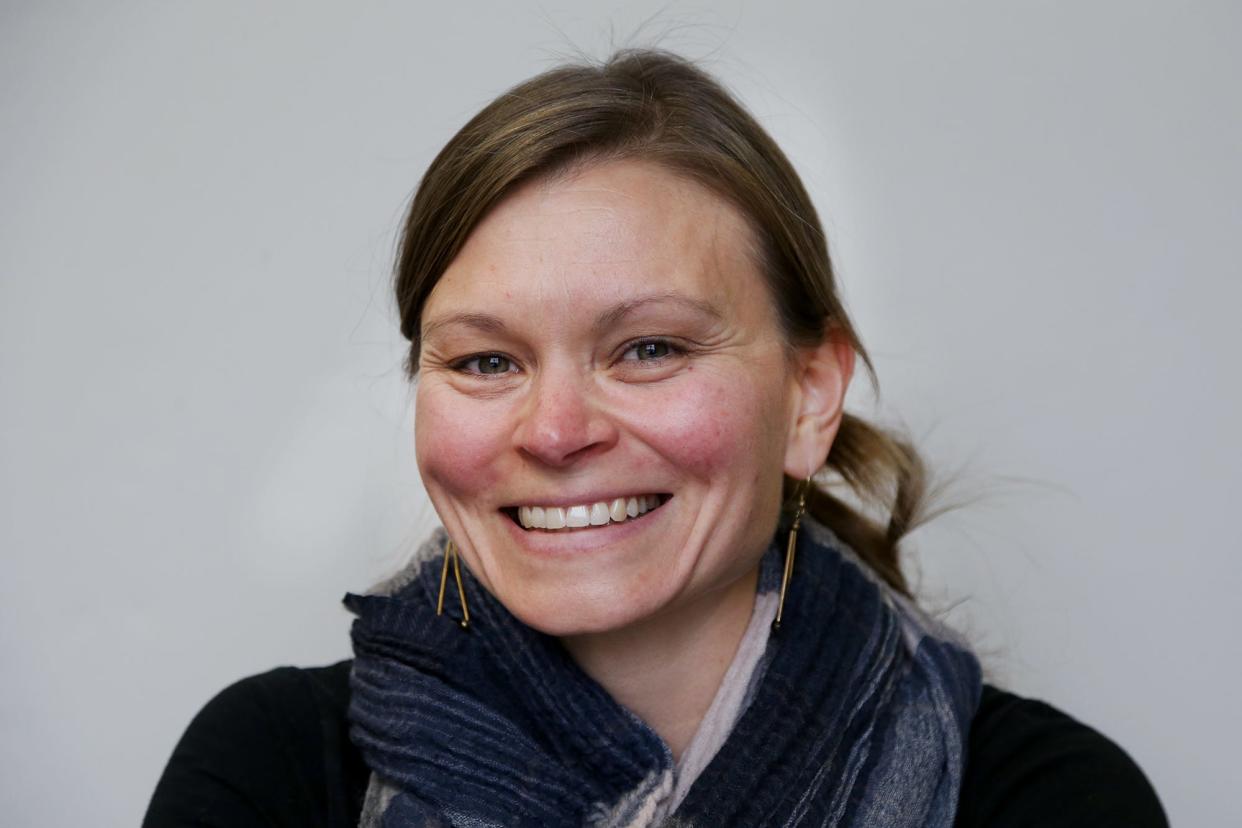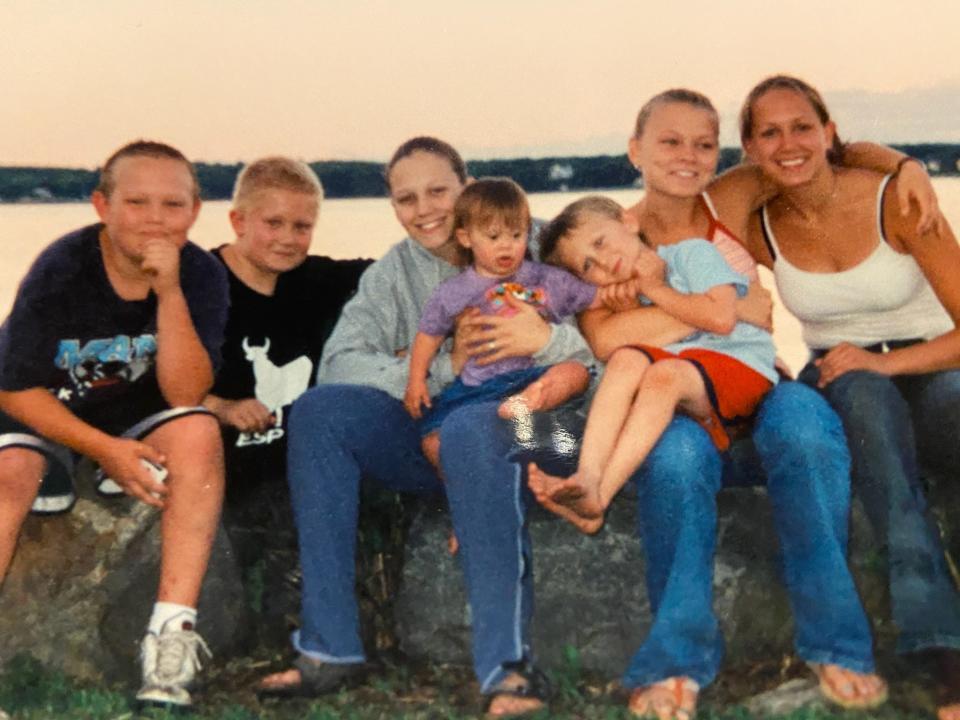Emily Flinkstrom, Women of the Year honoree from Maine, dedicates life to serving homeless

Emily Flinkstrom is one of USA TODAY’s Women of the Year, a recognition of women who have made a significant impact in their communities and across the country. The program launched in 2022 as a continuation of Women of the Century, which commemorated the 100th anniversary of women gaining the right to vote. Meet this year’s honorees at womenoftheyear.usatoday.com.
Long before she made a career of advocating for housing accessibility and affordability in her home state, Emily Flinkstrom, her seven siblings and their parents relied on the social safety net for support.
Attending Women, Infants and Children appointments, where she remembers they received free diapers, became the norm for the South Berwick native and her family growing up. Flinkstrom and her family would also receive assistance for purchasing goods at the grocery store via the Supplemental Nutrition Assistance Program, more commonly referred to as food stamps.
Flinkstrom credits her parents for shielding their children from financial worries. She headed to college determined to avoid stress over income. After earning a business administration degree, Flinkstrom joined the AmeriCorps Vista program, working in Salt Lake City with developmentally and intellectually disabled people.
The experience inspired her to pursue a master’s degree in social work from Colorado State University, where, in the midst of her studies, she worked at a homeless resource center.
“The fact that you really can’t do anything if you don’t have a stable place to live is a big part of what drew me to this work,” she said. “I think that’s really the foundation for anybody’s success in life, to be able to focus on anything other than the immediate need of knowing where you’re sleeping that night.”
In 2016, Flinkstrom was named the executive director of Fair Tide, the Kittery-based nonprofit that works to find permanent housing for people and families experiencing homelessness.
Since Flinkstrom took over, Fair Tide has secured lasting homes for 31 households. The agency is also presently working on two affordable housing development projects and, in tandem with Footprints Food Pantry, has purchased the former Kittery Family Practice building, where they will create a social services resources hub called Mainspring, expected to open in the summer of 2024.
For her work, Flinkstrom has been selected as the Maine honoree for USA TODAY's Women of the Year.
This conversation has been edited for length and clarity.
Who paved the way for you?
I think a lot of credit goes to my parents. I was saying earlier that I grew up in a household that didn't have a lot of money. My parents worked really hard and were just trying to make ends meet. There was a specific period of time that was really pretty tough financially, and we had to rely on the social safety net. I remember going to WIC (Women, Infants and Children) appointments with my siblings and getting free diapers, and I remember going to the grocery store and using what at that time were called food stamps. My mom had this little accordion folder where she kept her coupons and food stamps.
There is this one instance that has stuck with me for a long time. We were in line at the grocery store and she was opening that little accordion folder, and there was a guy standing behind us who made some horrible comment about how my mom shouldn't procreate if she couldn't support her children. I just vividly remember that anger, and I wasn't old enough to really, truly understand but I remember the feeling of shame and embarrassment. But at the same time, my parents worked their butts off, and they made sure our lives were filled with joy, and I never felt like we were lacking. So all of that is to say, thanks to them and those experiences, I have this lens through which I can approach my work with empathy and with understanding.


Who are you paving the way for?
Everybody that's going to come after me that's going to change the world. I hope to serve as a little piece of inspiration for future social workers, future community members who may feel like they don't know how to make a difference or they don't know if they can make a difference.
Is there a guiding principle or mantra you tell yourself?
One of my favorite professors in my social work program used to say all the time, ‘If you don't do it, no one will.’ That sounds really simple. When he was saying it, he was mostly referring to the mission and the purpose of the social work profession. Looking at social workers as individuals who are supposed to elevate and advocate for those who are powerless, who have little power, and whose voices are often ignored or silenced, he was saying, ‘If we as social workers don't do it, then who will?’
What is your definition of courage?
I think there can be a lot of definitions of courage but the one that sticks with me and resonates with me the most is the excerpt from Teddy Roosevelt’s speech that became known as the ‘Man in the Arena.’
‘It is not the critic who counts; not the man who points out how the strong man stumbles, or where the doer of deeds could have done them better. The credit belongs to the man who's actually in the arena, whose face is marred by dust and sweat and blood; who strives valiantly; who errs, who comes short again and again, because there is no effort without error and shortcoming; but who does actually strive to do the deeds; who knows the great enthusiasms, the great devotions; who spends himself in a worthy cause; who at the best knows in the end the triumph of high achievement, and who had the worst, if he fails, at least fails while daring greatly, so that his place shall never be with those cold and timid souls who neither know victory nor defeat.’
I think in general, courage is getting into that arena and staying there for the fight without really knowing what the outcome is going to be.
Who did or do you look up to?
In one of my internships in my masters of social work program, I worked for this amazing woman, Sister Mary Alice Murphy, and she ran a homeless resource center in Fort Collins, Colorado. She was in her 80s at the time, and she had just been fighting the good fight for her entire career. I look back on that after being fairly young in my career and thinking, ‘Wow, this is exhausting work.’ You have got to keep going.
How do you overcome adversity?
By not doing it alone. I think that the ability to tackle problems together is really powerful.
The same goes for personal life. Being surrounded by family and friends who know and love me and leaning on them during hard times is the key to getting through hard times.
What advice would you give your younger self?
I would say, enjoy and appreciate where you are now, no matter what the moment is, or the phase of life. I've always struggled with that.
2022 Women of the Year: Rep. Michele Meyer: ‘Courage is finding a way to grab hold of that hand that is reaching out’
Women of the Century: Maine Governor Janet Mills, women’s rights activists among state’s most influential women
This article originally appeared on Portsmouth Herald: USA TODAY honors Maine homelessness and affordable housing advocate

